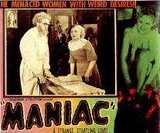Our editor-in-chief Nate Yapp is proud to have contributed to the new book Hidden Horror: A Celebration of 101 Underrated and Overlooked Fright Flicks, edited by Aaron Christensen. Another contributors include Anthony Timpone, B.J. Colangelo, Dave Alexander, Classic-Horror.com's own Robert C. Ring and John W. Bowen. Pick up a copy today from Amazon.com!
Cold Reads: A Rose for Emily by William Faulkner
Dark and dirty things occur in the Deep South at the dead of night, while the crickets are a-chirping and the big ol' devil moon is smiling down at the earth. I apologize for the folksy intro, but after reading "A Rose for Emily" by William Faulkner, I can't help but get in the moonshine spirit of things. If the bizarre effect the tale had on me isn't testament enough, I can personally assure you that Faulkner's prose will have you convinced that his town of Jefferson, Mississippi is as real as your own childhood home.
After old Miss Emily Grierson passes away, the town of Jefferson goes into a sense of mourning. The narrator recalls Emily's past, from her family's history to her recent demise. Emily had lived in her house all by herself, the old town biddies always whispering about her plans of marriage. When construction takes place in the town, a handsome foreman named Homer Barron comes down from the North to head the project. Everyone in town likes Homer, and he seems to enjoy everyone else's company, especially that of Miss Emily. The two soon appear to have thoughts of wedding bells with Emily buying Homer clothes and Homer moving into the house. But after a period of time, things become strange and quiet. And after Emily dies, people in the town start complaining of a foul scent emanating from the house...
Faulkner's tale is frightening in its stark realism. He doesn't exaggerate or flaunt any of the characters' eccentricities or manners. Nothing of a supernatural nature invades the town to wreak havoc on its denizens. Instead, the members of the town are prey to their own thoughts, thoughts fueled by the strangeness of the situation involving Miss Emily. One night, in an attempt to put an end to the offensive odor, a group of men sneaks towards the house and sprinkles lime around it. When Emily appears at the window, they scatter into the shadows like some mischievous hoodlums. Fear is the only monster in this story, and it devours the minds of everyone who looks at the edifice of the old Grierson house.
This is not fear unfounded, though. There is certainly something most terrible occurring in Emily's house. But Faulkner never lets on to this with more than a passing phrase. The story is filled with a quiet, brooding sense of dread that sneaks up on you like a hungry shadow. A skin-crawling scene occurs when Emily makes a visit to the town pharmacist to order poison. At first, she does this by asking the old man for his most potent toxin available. When he informs her that it is arsenic, Emily insists on its purchase. The pharmacist kindly tells her that he is regulated to ask for the purpose of the poison's usage before he can sell it. Emily does not respond, but simply stands there staring intently at him. At this moment the pharmacist is aware of the potential danger of the situation. We know as well, but we are just as helpless as he is. Faulkner achieves this same sensation at the story's conclusion. I will not say anything to spoil it for you, other than that the tale's last line will confirm all the fears that the townspeople had (and yours as well) and will allow your mind to imagine the worst and grisliest of implications.
Another aspect that Faulkner excels in is exacting the voice of the South. He gives you the feeling that you are listening to a true account from the member of a real Mississippi town. It has the voice of the old town gossip who lets you in on the town's darkest secrets or even the voice of your own grandfather, sitting on the porch, smoking a pipe, and reminiscing on that nasty business that occurred when he was just a boy and heard from his grandpappy. The term Southern Gothic can most appropriately be applied to this dark tale. It gives you the sense of the fog-shrouded moor or the decaying castle but with the aesthetics of a rural town. We now have misty bayous and rotting plantations, but that feeling of death and evil still lurks in every corner. It creates a palpable and realistic environment for the terror to occur in along with three-dimensional characters whose sins only darken the mood.
"A Rose for Emily" is a beautiful flower in of itself, an enchanting, scarlet blossom set amongst the muted horror of a silent graveyard. This is a tale that I would whole-heartedly advise not to read alone, especially when the wind is whispering through the cypress trees and the birds are singing their night songs. The ending will slowly, oh so slowly, creep up on you. And when you finally turn around to confront it... it will be too late.









Read this story in a class in
Read this story in a class in my Freshmen year of college. It is a mind-blowing story and one of my favorites
You've finally written about
You've finally written about something that's completely new to me, as I've neither read nor even heard of it (we read other Faulkner work in school). But, as always, you've made me want to read it. I'll be checking this out as soon as possible.
By the way, I have heard of "A Rose for Emily", but it was the song by The Zombies. According to my album insert, it was inspired by the film.
Chris Gaskey
http://chrisgaskey.tumblr.com
http://www.skyemag.com
http://www.facebook.com/chrisgaskey
http://www.twitter.com/chrisgaskey
Jose, You've made another
Jose,
You've made another great choice. This is a story I've been arguing with fellow lit students about since I was 16. Here's the thing: I see Homer Barron as a homosexual. I do not at all feel that this reading is far-fetched. The text says that he "enjoys the company of men" and his name is, of course, Homer-effing-Barron. I feel that's enough to really cement the interpretation, but he is also a bit of a dandy, no? Don't get me wrong, I haven't read this story in a few years, and I don't think it's his best piece (hello, that is obviously Old Man), but I find it frustrating to be constantly shouted at when I say this. It seems so obvious to me--like listening to "Rocket Man" as an adult and trying to pretend that it isn't about homosexuality. Mayhaps this is because I grew up in rural Illinois and went to college in Missouri. Who knows?
What's your take?
Pax- It does have a great,
Pax- It does have a great, lingering sense of dread, doesn't it? It's the only Faulkner work I've read and I really dig it.
Chris- Glad you've found interest in a new piece of work! I hope that you'll enjoy it once you get around to reading it. Ironically, I've never heard of that song by The Cranberries. Since I adore that band, I'll have to check it out now. So thank you for showing me something new as well!
Missy- I don't feel that your reading is far-fetched at all. Faulkner doesn't really give too many clues as to what it was that caused the rift between Homer and Emily. Given that Emily is noted as being stuck in the past (and thus would probably have a stricter moral code), the discovery of Homer's sexual orientation could very well have sent her over the edge. So I find that your interpretation holds up quite well given your supporting evidence.
And not to meander too much here, but I think it's ridiculous for someone to shoot down any one person's interpretation of a work. Analysis is clearly subjective and it's more than likely that not everyone will see eye to eye on a given interpretation. It's preposterous for someone to say "Your analysis is wrong." If the interpreation logically holds up within the framework that the writer has constructed, than no one should nay say it.
I actually said "The
I actually said "The Zombies", who, if you haven't heard them, are a fantastic band in their own right. - http://en.wikipedia.org/wiki/The_Zombies
I can see why you'd get confused, though. "Zombie" is one of my favorite songs of all-time.
Chris Gaskey
http://chrisgaskey.tumblr.com
http://www.skyemag.com
http://www.facebook.com/chrisgaskey
http://www.twitter.com/chrisgaskey
i am a chinese girl which
i am a chinese girl which have a homework that write a report after reading a rose for emily. It is amazing to find your page. that's great. you are a genius of writing. your feeling is really cool. i like your words.